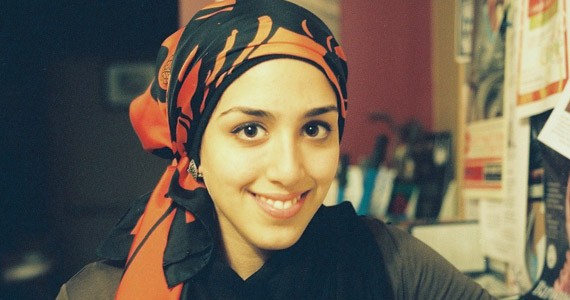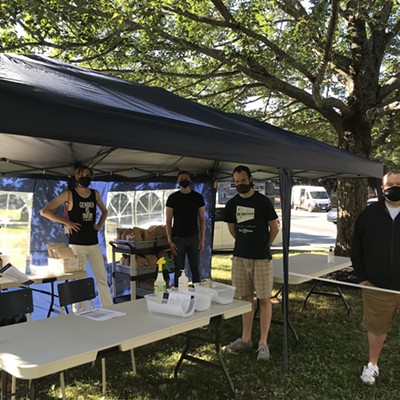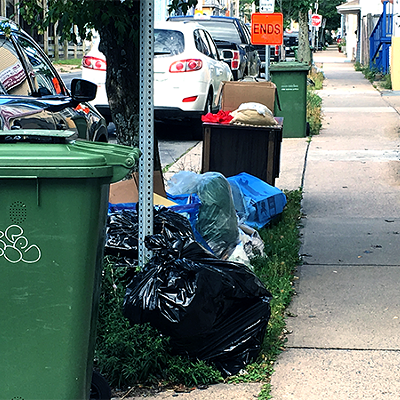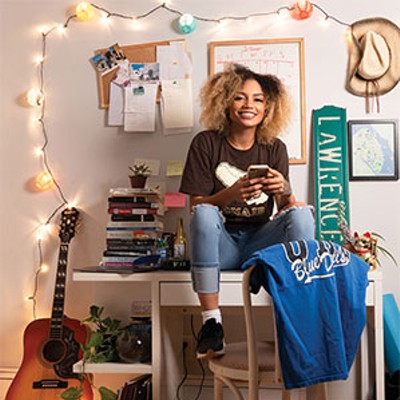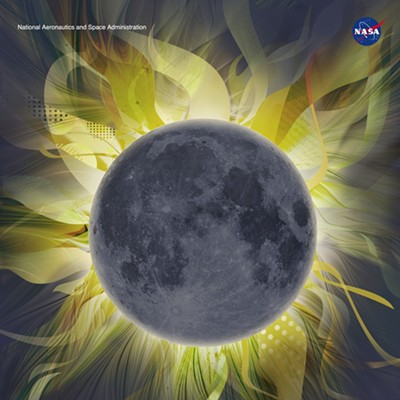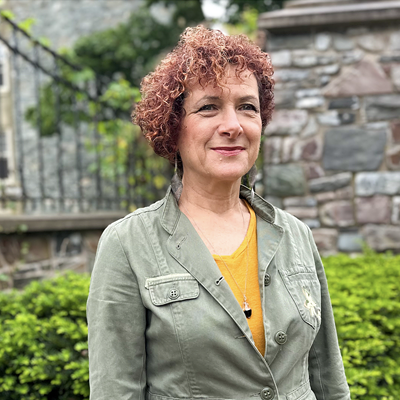As I whiz down Agricola Street on my bike, going to work at a screenprinting collective, I find a certain comfort in knowing that my hijab is safely tucked in under my blue helmet. Those few minutes on my bike give me a certain amount of anonymity that walking doesn't.
My hijab has become like a flare, signaling judgment from people left and right--- creating unnecessary attention.
I decided to wear the hijab in 2004, when I was 20. I know it is hard to believe, taking into account public perception of Muslims nowadays, but I did choose to wear it. No, my parents did not force me to wear it, it was my choice. In fact, my mum, who decided to wear the hijab at the age of 37, tried to make me wait awhile longer before I made that decision, as it is such a big commitment---but I protested. And now, looking back, I wish I had waited.
In the Quran it says Allah told Prophet Mohammed to ask the women in his family to wear the veil and dress modestly when they are outside the house. In Islamic tradition we have something called Sunnah---best explained as the actions and behaviours of the Prophet and his family. Muslims try to increase their piety by doing Sunnah. Although wearing the hijab has not been explicitly written in the Quran for other women, Muslim women around the world do it as it considered part of the Sunnah---by wearing it you are increasing your faith, righteousness and piety. The hijab is a significant part of practicing the Islamic faith and being a believer for women. It is seen as a sign of modesty and a way to divert the attention from your body to who you are and your personality.
There were a number of reasons that pushed me to put on the hijab. Of course, there was the religious aspect of it: It was a time when I had a deeper spiritual connection to my faith and I felt wearing the hijab was a step closer to that connection. Thinking about it now, I will also admit that a big portion of it was peer pressure. Two of my best friends had just started wearing the hijab and were constantly asking, "When are you going to wear it, Nour?" "Don't you think it is about time?"
The hijab has become such a hot topic in the last couple of years that I have realized how important it is to be honest with myself about it, rather than spend my life trying to explain myself to curious passersby.
I should clarify here that I do not speak on behalf of Muslim women, or fellow hijabis. This is my experience and only mine. I take full ownership of everything I say and I am telling it to you in the hope that you understand a little more about the complexity of the "hijab experience." Also, note that not all Muslim women are covered---and that is OK. We are all different and we have all been through distinct things that have shaped who we are now, and our choices. We all come from different countries and different families. Just like all Canadians are different, so are Middle Easterners.
To start, I want to get rid of any crazy stereotypes and preconceptions about me as a Muslim Arab woman. No, I am not oppressed; no, I am not a fundamentalist; no, my parents did not attempt to marry me off at the age of nine to a man 20 years older than me; no, I am not an extremist; no, I don't just wear black; no, I am not filthy rich; no, my dad does not own an oil company.
Yes, I can shake hands with men; yes, I am liberal; yes, I am educated; yes, I can speak and write English fluently; yes, I am a strong, empowered independent woman; yes, I do have a choice.
If you continue to hang on to the image of long draping black cloaks, sad-looking droopy eyes hiding behind the niqab---face veil---and an oppressed lifestyle as your sole idea of what makes a Muslim woman, then I am sorry to break it to you, but you hold a one-dimensional perspective shaped by what skewed media outlets want to show you about a part of the world that is currently negatively portrayed.
I am not saying there aren't Muslim women out there who do not lead oppressed lives and are being forced into a certain lifestyle. All I am saying is, stop putting ALL Muslim women into one box. It's judgmental. And wrong. We are all different. We just have one thing in common---the hijab---that's it.
I am pretty relaxed and diverse with how I like to wear my hijab. It really depends on my mood, what I am wearing and, sometimes, the weather. Sometimes I like to wear my hijab in a more "traditional" style---this is when I rest the centre of the fabric on the crown of my head and then turn one side of the fabric around my face so it frames it. Usually I tuck the excess fabric underneath so it rests on my shoulder.
On other days I like to tie my hijab like a bandana, where I make a regular knot or bow at the nape of my neck. When I feel like being fashion-forward and edgy I tie my hijab in a turban style---a style which, though usually associated with particular Eastern regions and religions, has lent an exotic hand to the West by making cameo appearances in magazines like 1970s British Vogue features or movies like Sex and the City 2.
Finally, on cold I'm-not-so-bothered days, I tuck all my hair under a beanie.
Often I get asked if I am "subjugated," but the truth is the hijab does not make me feel oppressed. It's the questions that people ask, when society treats me like I am from outer space---"interesting" and "exotic"---that I start to feel oppressed. I have only felt oppressed by people who choose to exclude me from certain parts of society because of an item of clothing I chose to wear.
The reason why society, in my opinion, is the main oppressor to covered women is because it holds this stereotype---this idea as the standard of how covered women should act, behave, say and be. So when they don't fit the stereotype, it is outrageous, it is misunderstood, it is not tolerated.
My experience here in Halifax has not exactly been one of a welcoming nature. I moved here in December 2010, and over the past two years I have been faced with questions, questions and more questions. Not that I mind answering---it just can be so tiring to feel like you constantly have to explain yourself and who you are beyond that piece of fabric, when that is all people want to know about.
Of course, there have been many positive experiences, from the odd compliment here and there to people who look beyond the veil and appreciate who I am and what I am capable of.
The younger generation is definitely more tolerant, open and willing to have a conversation. Since most of my peers have grown up in a liberal society, university provides the perfect setting to have debates about religion and history with no restrictions, creating intercultural understanding. Although it can be difficult to get some of my peers to warm up to me due to preconceived misconceptions, for most of them, it's no big deal.
However, there have been quite a few negative experiences as well. This summer, my mum wanted to go check out one of the free jazz concerts being held at Public Gardens. As we reached the sitting area, she found an empty seat on a bench next to a white senior male and decided to sit. As she sat down he got agitated, pushed her off and shouted "Go back to where you came from"---on Canada Day.
Even among Middle Easterners, being a veiled woman can be quite difficult. I find it particularly hard to find my place. Why? Because I like to classify myself as an "in-between" person---I live my life moderately and in the middle between crazy and traditional. You see, "traditional"---or as I would like to call them, "uptight, old-fashioned and narrow-minded"--- Middle Easterners don't accept people like me because I am too open-minded for them. They don't understand why I don't conform and behave like a veiled woman should---whatever the hell that is.
Then you have the crazy, party-animal Middle Easterners who don't accept me either because they assume that I am "boring," "conservative," "afraid," not "fun" enough and so on.
My life with the hijab has really been a life filled with judgment from everyone. The West judges me by assuming I am oppressed and "conditioned since birth" to a certain doctrine. Traditional Muslims judge me because I allow myself to go to a party with alcohol and dance with guys and do unconventional things for a hijabi. Non-covered Muslim women feel sorry for me because they think that they are more "liberated" than me.
Of course, I have met many people from around the world who have been nothing but loving and welcoming. But, I can't help feel that the judgment outweighs the experiences I have had of people just being open and welcoming about what I'm wearing.
Putting the hijab on is a really big commitment for a woman, a commitment that over the years she might struggle with---like I have in recent years. As a hijabi woman you have to cover your hair every time you are outside your house and around men not related to you. You only uncover your hair at home, around other women and family members. It is a big commitment because a hijabi woman has become, in the Islamic community, a representation of Islam, even more than men who do not have to wear anything that is recognizably Islamic. Thus, as a hijabi woman you have expectations from members of your community and other communities who think you are wrong to stray from a "straight" path as you are the walking representation of Islam and thus, you must remain modest and reserved. Consequently, most times you feel your actions and decisions are watched and criticized if they don't fit that expectation. It is not a clearcut path that one decides to embark on and will never want to stray from.
By decreasing the amount of stress you put on the fact that a woman is wearing the hijab you might allow her to have the space she needs to be comfortable with it and with her decision. It will also allow her to have a safe environment to choose who she wants to be with it---and if she ever decides to take it off---without it, all free of judgment.
I found it incredibly disappointing in 2011 when foreign journalists asked Yemeni Nobel Peace Prize winner Tawakkol Karman about her hijab and how it is "not proportionate with her level of intellect and education"---clearly showing the judgment they hold of covered women being oppressed and uneducated.
Nonetheless, her reply shut them up quite well: "Man in the early times was almost naked, and as his intellect evolved he started wearing clothes. What I am today and what I'm wearing represents the highest level of thought and civilization that man has achieved, and is not regressive. It's the removal of clothes again that is regressive back to ancient times."
Or as Mark Twain once said: "Clothes make the man. Naked people have little or no influence on society."
I want to take a minute to encourage students to befriend other students from other cultures. Even though I have never had a negative experience with a fellow peer, I always sensed that some of them were more reserved around me. As in, they are less willing to take the friendship beyond the classroom.
This semester, make a point of getting to know someone from another culture on a much deeper level---so get to know them beyond the "did you do this assignment" and "the weather is terrible today" level. University is one of your main shots at expanding your networks across the globe---you never know when you might need someone to show you around or expand your business in Dubai, Beirut, Jakarta or Johannesburg.
Let's try to be OK with whatever people wear---whether it is a bikini top and shorts, or a black cloak---as long as that person feels comfortable with it and feels it represents who they are. It is not your place to think you are better than them just because you make a different choice.
It is just a different way of life.
Editor’s note: A different version of this article has appeared at halifax.mediacoop.ca.

